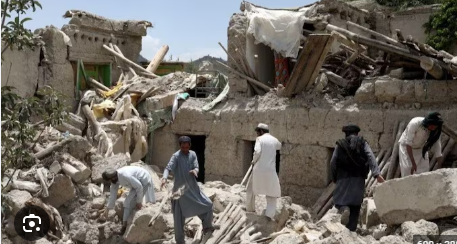Manas Dasgupta
NEW DELHI, Oct 8: The death count from a series of strong earthquakes that shook western Afghanistan rose sharply on Sunday to more than 2,000 as rescuers scrabbled for survivors among the ruins of villages razed to the ground, Taliban government spokesman said.
Saturday’s magnitude 6.3 quake — followed by eight strong aftershocks — jolted hard-to-reach areas 30 km northwest of the provincial capital of Herat, toppling rural homes and sending panicked city dwellers surging into the streets. “Unfortunately, the casualties are practically very high,” deputy government spokesman Bilal Karimi said early Sunday, as the extent of the damage became clear.
Official sources said 465 houses had been reported destroyed and a further 135 were damaged. “Partners and local authorities apprehend the number of casualties to increase as search and rescue efforts continue amid reports that some people may be trapped under collapsed buildings,” the U.N. sources said. The United States Geological Survey said the quake’s epicentre was about 40 kilometres northwest of Herat city. It was followed by three very strong aftershocks, measuring magnitude 6.3, 5.9 and 5.5, as well as lesser shocks.
At least five strong tremors struck the city around noon, Herat city resident Abdul Shakor Samadi said. “All people are out of their homes,” Samadi said. “Houses, offices and shops are all empty and there are fears of more earthquakes. My family and I were inside our home, I felt the quake.” His family began shouting and ran outside, afraid to return indoors.
As night fell Saturday in Sarboland village of Zinda Jan district, media persons saw dozens of homes ruined near the epicentre of the quakes, which shook the area for more than five hours. Men shovelled through piles of crumbled masonry as women and children waited in the open, with destroyed homes displaying personal belongings flapping in the harsh wind.
The World Health Organization (WHO) said more than 600 houses were destroyed or partially damaged across at least 12 villages in Herat province, with some 4,200 people affected. “In the very first shake all the houses collapsed,” said 42-year-old Bashir Ahmad. “Those who were inside the houses were buried,” he said. “There are families we have heard no news from.”
Another resident Neek Mohammad said he was at work when the first quake struck at around 11:00 am (0630 GMT). “We came home and saw that actually there was nothing left. Everything had turned to sand,” said the 32-year-old, adding that some 30 bodies had been recovered. “So far, we have nothing. No blankets or anything else. We are here left out at night with our martyrs,” he said as darkness began to fall.
In Herat city, residents fled their homes and schools, hospitals and offices evacuated when the first quake was felt. Afghanistan is already suffering in the grip of a dire humanitarian crisis, with the widespread withdrawal of foreign aid following the Taliban’s return to power in 2021.
Herat province — home to some 1.9 million people on the border with Iran — has also been hit by a years-long drought that has crippled many already hardscrabble agricultural communities. Afghanistan is frequently hit by earthquakes, especially in the Hindu Kush mountain range, which lies near the junction of the Eurasian and Indian tectonic plates.
More than 1,000 people were killed and tens of thousands left homeless in June last year after a 5.9-magnitude quake — the deadliest in Afghanistan in nearly a quarter of a century — struck the impoverished province of Paktika.
The World Health Organization in Afghanistan said it dispatched 12 ambulance cars to Zenda Jan to evacuate casualties to hospitals. “As deaths & casualties from the earthquake continue to be reported, teams are in hospitals assisting treatment of wounded & assessing additional needs,” the U.N. agency said on X. “WHO-supported ambulances are transporting those affected, most of them women and children.”
Telephone connections went down in Herat, making it hard to get details from affected areas. Videos on social media showed hundreds of people in the streets outside their homes and offices in Herat city. Herat province borders Iran. The quake also was felt in the nearby Afghan provinces of Farah and Badghis, according to local media reports.
The Taliban urged local organizations to reach earthquake-hit areas as soon as possible to help take the injured to hospital, provide shelter for the homeless, and deliver food to survivors. They said security agencies should use all their resources and facilities to rescue people trapped under debris. “We ask our wealthy compatriots to give any possible cooperation and help to our afflicted brothers,” the Taliban said on X.

